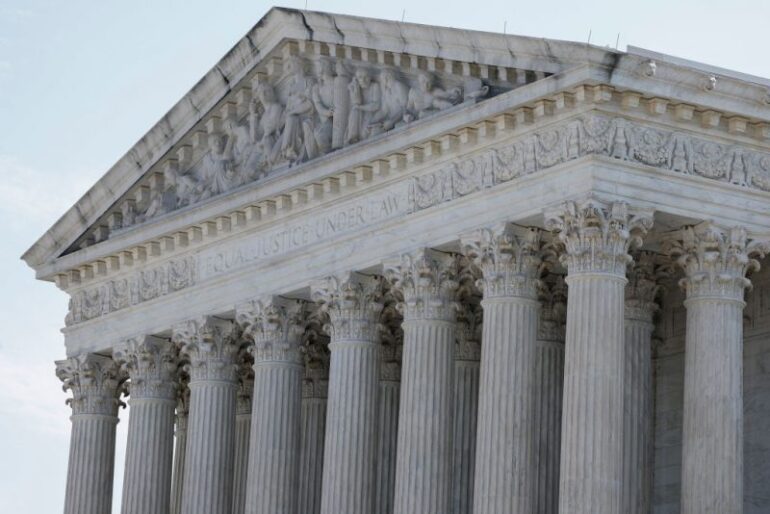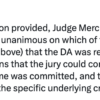🔴 Website 👉 https://u-s-news.com/
Telegram 👉 https://t.me/usnewscom_channel
OAN’s Abril Elfi
9:07 AM – Saturday, June 29, 2024
The Supreme Court has overturned the 1984 decision in Chevron v. Natural Resources Defense Council, which mandated judicial deference to agencies in cases where the law is unclear.
Advertisement
The National Oceanic and Atmospheric Administration’s (NOAA) federal rule requiring fishermen to pay $700 per day for an “at-sea monitor” is outside the authority that Congress granted the federal agency, according to the majority of the court in a 6-2 decision.
The justices heard the arguments in January in two cases arising from lawsuits filed by Rhode Island and New Jersey fishermen opposing NOAA’s rule, which they claim threatened to destroy their livelihoods.
The Chevron doctrine, a legal theory developed in the 1980s, states that if a federal regulation is contested, the courts should accept the agency’s reasonable interpretation of whether Congress gave it the right to issue the rule, provided that Congress had not directly addressed the issue. This theory was overruled by the court’s decision.
“Chevron is overruled,” Chief Justice John Roberts wrote for the court’s majority. “Courts must exercise their independent judgment in deciding whether an agency has acted within its statutory authority, as the APA requires. Careful attention to the judgment of the Executive Branch may help inform that inquiry. And when a particular statute delegates authority to an agency consistent with constitutional limits, courts must respect the delegation while ensuring that the agency acts within it.”
“But courts need not, and under the APA, they may not defer to an agency interpretation of the law simply because a statute is ambiguous,” he added. “Chevron was a judicial invention that required judges to disregard their statutory duties.”
“And the only way to ‘ensure that the law will not merely change erratically but will develop in a principled and intelligible fashion,’” he said, citing Vasquez v. Hillery, is “for us to leave Chevron behind.”
Justice Clarence Thomas wrote that Chevron deference “permits the Executive Branch to exercise powers not given to it.”
“Chevron deference was ‘not a harmless transfer of power,’” Thomas wrote. “‘The Constitution carefully imposes structural constraints on all three branches, and the exercise of power free of those accompanying restraints subverts the design of the Constitution’s ratifiers.’ In particular, the Founders envisioned that ‘the courts [would] check the executive by applying the correct interpretation of the law.”
“Chevron was thus a fundamental disruption of our separation of powers. It improperly strips courts of judicial power by simultaneously increasing the power of executive agencies. By overruling Chevron, we restore this aspect of our separation of powers,” he said.
The fishermen claimed that 20% of their revenue is lost due to the required expense of at-sea monitors.
Dissident from the majority, Justices Elena Kagan and Sonia Sotomayor stated that the Chevron “has formed the backdrop against which Congress, courts, and agencies—as well as regulated parties and the public—all have operated for decades. It has been applied in thousands of judicial decisions.”
“It has become part of the warp and woof of modern government, supporting regulatory efforts of all kinds—to name a few, keeping air and water clean, food and drugs safe, and financial markets honest. Judges are not experts in the field and are not part of either political branch of the government,” Kagan wrote. “Those were the days when we knew what we were not. When we knew that between courts and agencies, Congress would usually think agencies were the better choice to resolve the ambiguities and fill the gaps in regulatory statutes.”
“Because agencies are ‘experts in the field.’ And because they are part of a political branch with a claim to making interstitial policy, And because Congress has charged them, not us, with administering the statutes containing the open questions,” she continued. “At its core, Chevron is about respecting that allocation of responsibility—the conferral of primary authority over regulatory matters to agencies, not courts.”
Jerry Leeman, CEO of the New England Fishermen’s Stewardship Association (NEFSA), praised the Friday decision, stating that “Federal officials usually ignore the well-grounded concerns American fishermen share about overregulation.”
“We are grateful to the Supreme Court for bucking this trend. And we are especially grateful to the fishermen-plaintiffs in Relentless and Loper Bright who have spent years fighting for their brother and sister fishermen everywhere,” he added.
Stay informed! Receive breaking news blasts directly to your inbox for free. Subscribe here. https://www.oann.com/alerts

